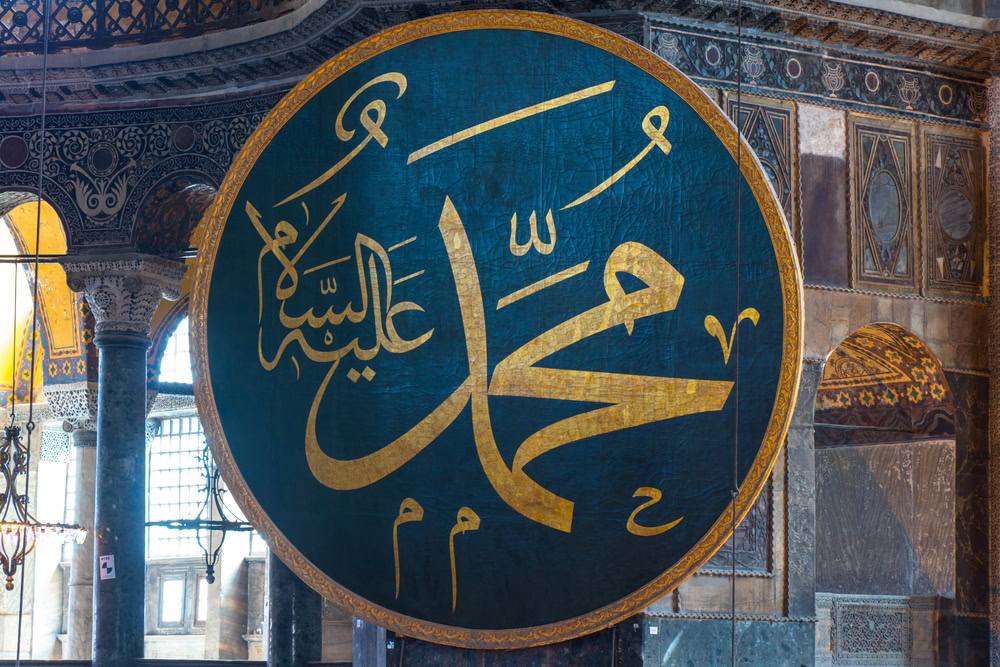What Are the Names of the Prophet (Allah Bless Him and Give Him Peace)?
Answered by Shaykh Dr. Muhammad Fayez Awad
Question
What are the names of the Prophet (Allah bless him and give him peace)?
Answer
In the name of Allah, the Most Gracious, the Most Merciful.
All praise is due to Allah, Lord of all worlds. Peace and blessings be upon the Messenger sent as a mercy to the worlds, our Master and Prophet, Muhammad, and his Family and Companions.
His Status (Allah Bless Him and Give Him Peace)
One of the numerous evidences of the high rank and esteemed status of the Prophet (Allah bless him and give him peace) is the abundance of his names.
The many names, each beautiful in meaning, reflect the numerous praiseworthy qualities and attributes of the one who bears them.
Among all the prophets, no other prophet is known to have as many names as our Prophet (Allah bless him and give him peace). Several scholars have compiled lists of his names, such as Qadi Iyad in his book “al-Shifa bi Ta‘rif Huquq al-Mustafa,” where he wrote:
“Allah (Most High) distinguished our Prophet Muhammad (Allah bless him and give him peace) by adorning him with many names, both in the Quran and on the tongues of the previous prophets. After much contemplation and reflection, I was able to gather a collection of these names. Despite the fact that no one had previously compiled more than two names together, we have listed about thirty names in this section. We hope that Allah (Most High), just as He has inspired us to recognize and confirm these names, will complete His favor by revealing even more names to us in the future.”
Two Types
Ibn Qayyim (Allah have mercy on him) also commented:
“The names of the Prophet (Allah bless him and give him peace) are of two types:
- Specific names that none of the other messengers share, such as Muhammad, Ahmad, al-‘Aqib, al-Hashir, al-Muqaffi, and Nabi al-Malhama.
- Names that others share in meaning, but he (Allah bless him and give him peace) possesses their perfection. In this regard, these names are specific to him in their completeness, such as Messenger of Allah, His Prophet, His Servant, The Witness, The Bearer of Glad Tidings, The Warner, The Prophet of Mercy, and The Prophet of Repentance.
If one were to assign him a name for each of his attributes, his names would exceed two hundred, such as The Truthful, The Trusted, The Compassionate, The Merciful, and others. This is why some have said that Allah has a thousand names, and the Prophet (Allah bless him and give him peace) has a thousand names, as mentioned by Abu al-Khattab Ibn Dihya. What is meant here are attributes.” [Ibn Qayyim, Zad al-Ma‘ad]
Muhammad and Ahmad (Allah Bless Him and Give Him Peace)
Among the names of the Prophet (Allah bless him and give him peace) mentioned in the Quran are “Muhammad” and “Ahmad.” The name “Muhammad” appears in several places, such as in the verse:
“Muhammad is the Messenger of Allah.” [Quran, 48:29]
The name Ahmad is mentioned in the verse:
“…and giving good news of a messenger after me whose name will be Ahmad.” [Quran, 61:6]
His Other Names
In the Sunna, the Prophet (Allah bless him and give him peace) also mentioned several of his names. Muhammad Ibn Jubayr Ibn Mut‘im narrated from his father that the Prophet (Allah bless him and give him peace) said:
“I have names: I am Muhammad, I am Ahmad, I am al-Mahi (the Eraser) by whom Allah erases disbelief, I am al-Hashir (the Gatherer) before whom people will be resurrected, and I am al-‘Aqib (the Final Prophet) after whom there will be no other.” [Bukhari; Muslim]
Additionally, Allah (Most High) described the Prophet (Allah bless him and give him peace) as Ra’uf (Compassionate) and Rahim (Merciful). Abu Musa reported:
“The Prophet (Allah bless him and give him peace) named himself for us with several names. Among them were names that we remembered and some that we forgot. He said: ‘I am Muhammad, I am Ahmad, I am al-Muqaffi (the Last in line), I am al-Hashir (Gatherer), I am the Prophet of Repentance (Nabi al-Tawba), and the Prophet of Battle (Nabi al-Malhama).’” [Muslim; Ibn Hibban; Hakim; Ahmad]
May Allah bless us with love for the Prophet (Allah bless him and give him peace), enable us to follow his example, and allow us to receive his intercession on the Day of Judgment. Indeed, Allah is All-Hearing and All-Responsive.
[Shaykh] Dr. Muhammad Fayez Awad
Shaykh Dr. Muhammad Fayez Awad, born in Damascus, Syria, in 1965, pursued his Islamic studies in the mosques and institutes of Damascus. A graduate of the Islamic University of Medina in 1985, he holds a Ph.D. in Islamic Studies from Bahauddin Zakariya University in Pakistan.
He has extensive experience developing curricula and enhancing the teaching of various academic courses, including conducting intensive courses. Shaykh Awad has taught Fiqh, Usul al-Fiqh, Quranic sciences, the history of legislation, inheritance laws, and more at several institutes and universities such as Al-Furqan Institute for Islamic Sciences and Majma‘ al-Fath al-Islami in Damascus.
He is a lecturer at the Sultan Muhammad al-Fatih Waqf University in Istanbul, teaching various Arabic and Islamic subjects, and teaches at numerous Islamic institutes in Istanbul. Shaykh Awad is a member of the Association of Syrian Scholars, a founding member of the Zayd bin Thabit Foundation, a member of the Syrian Scholars Association, and a member of the Academic Council at the Iman Center for Teaching the Sunna and Quran.
Among his teachers from whom he received Ijazat are his father, Shaykh Muhammad Muhiyiddin Awad, Shaykh Muhiyiddin al-Kurdi, Shaykh Muhammad Karim Rajih, Shaykh Usama al-Rifai, Shaykh Ayman Suwaid, Shaykh Ahmad al-Qalash, Shaykh Muhammad Awwama, and Shaykh Mamduh Junayd.
